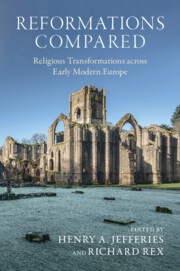Book contents
- Reformations Compared
- Reformations Compared
- Copyright page
- Contents
- Notes on Contributors
- Introduction
- 1 Saxon Comparisons
- 2 Contrasting Outcomes in the Swiss Confederation
- 3 Austria and Bohemia
- 4 In the Shadow of the Crescent Moon
- 5 Beyond Toleration
- 6 Nordic Reformations Compared
- 7 The Reformations along the Southern Baltic Littoral
- 8 Reformations in the Low Countries
- 9 Tales of the Unexpected
- 10 British Reformations Compared
- 11 The Reception of the Protestant Reformation in the Iberian Peninsula
- 12 Italy and Its Reformations Reconsidered
- Index
- References
11 - The Reception of the Protestant Reformation in the Iberian Peninsula
Published online by Cambridge University Press: 14 March 2024
- Reformations Compared
- Reformations Compared
- Copyright page
- Contents
- Notes on Contributors
- Introduction
- 1 Saxon Comparisons
- 2 Contrasting Outcomes in the Swiss Confederation
- 3 Austria and Bohemia
- 4 In the Shadow of the Crescent Moon
- 5 Beyond Toleration
- 6 Nordic Reformations Compared
- 7 The Reformations along the Southern Baltic Littoral
- 8 Reformations in the Low Countries
- 9 Tales of the Unexpected
- 10 British Reformations Compared
- 11 The Reception of the Protestant Reformation in the Iberian Peninsula
- 12 Italy and Its Reformations Reconsidered
- Index
- References
Summary
The discovery of a consignment of books of Protestant propaganda in Seville in the autumn of 1557 convinced the Spanish inquisitors of the existence of clandestine circles that promoted doctrines that contradicted Catholic orthodoxy as redefined between 1547 and 1552 during the first sessions of the Council of Trent. The discovery of a second community of religious dissidents in Valladolid a few weeks later, followed by the arrest on suspicion of Lutheranism of Bartolomé de Carranza y Miranda, archbishop of Toledo, on 22 August 1559 created the impression in the royal court of Philip II that Spain had escaped an odious heretical conspiracy hatched by foreigners and supported by members of its own nobility and senior clergy. Some of the outstanding figures among the Seville and Valladolid dissidents cannot, contrary to what historiography has long maintained, be characterised simply as Erasmists; many of them subscribed to the doctrinal core of Protestantism. There were several networks of Lutherans in Spain, as well as among the communities of exiled Spaniards throughout Europe. The Reformation made a greater impression in Iberia than has long been assumed.
Keywords
- Type
- Chapter
- Information
- Reformations ComparedReligious Transformations across Early Modern Europe, pp. 242 - 265Publisher: Cambridge University PressPrint publication year: 2024

